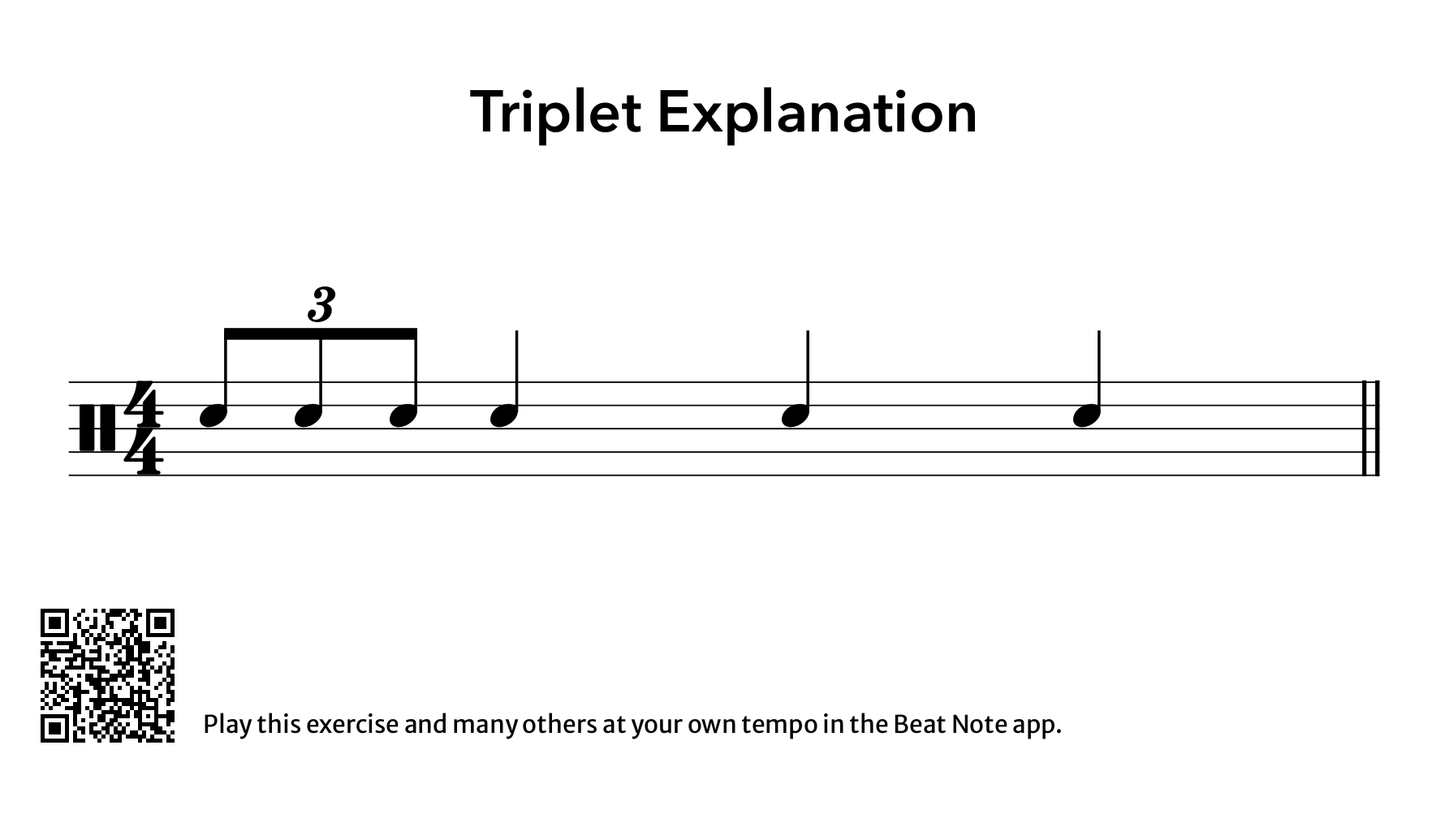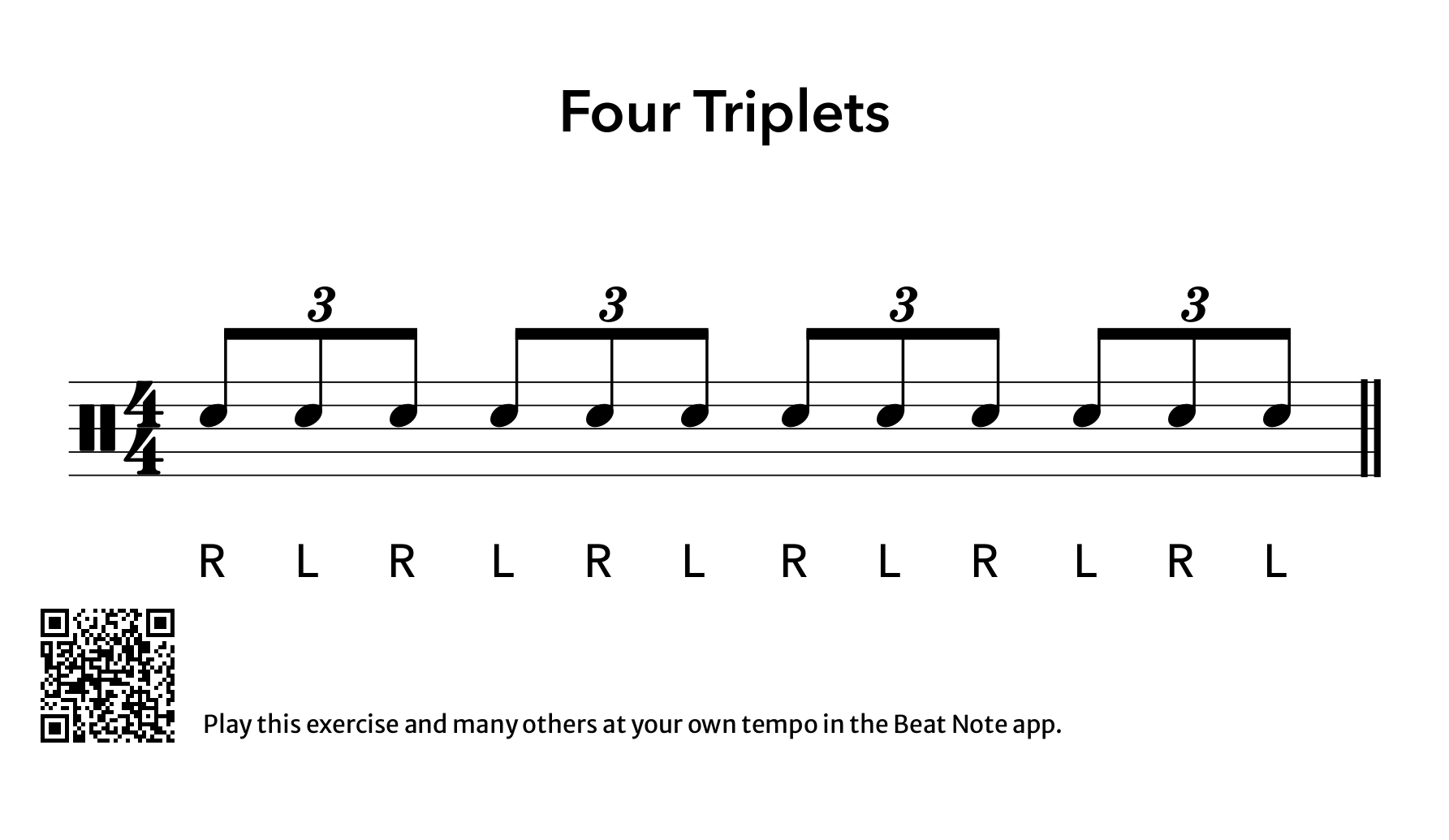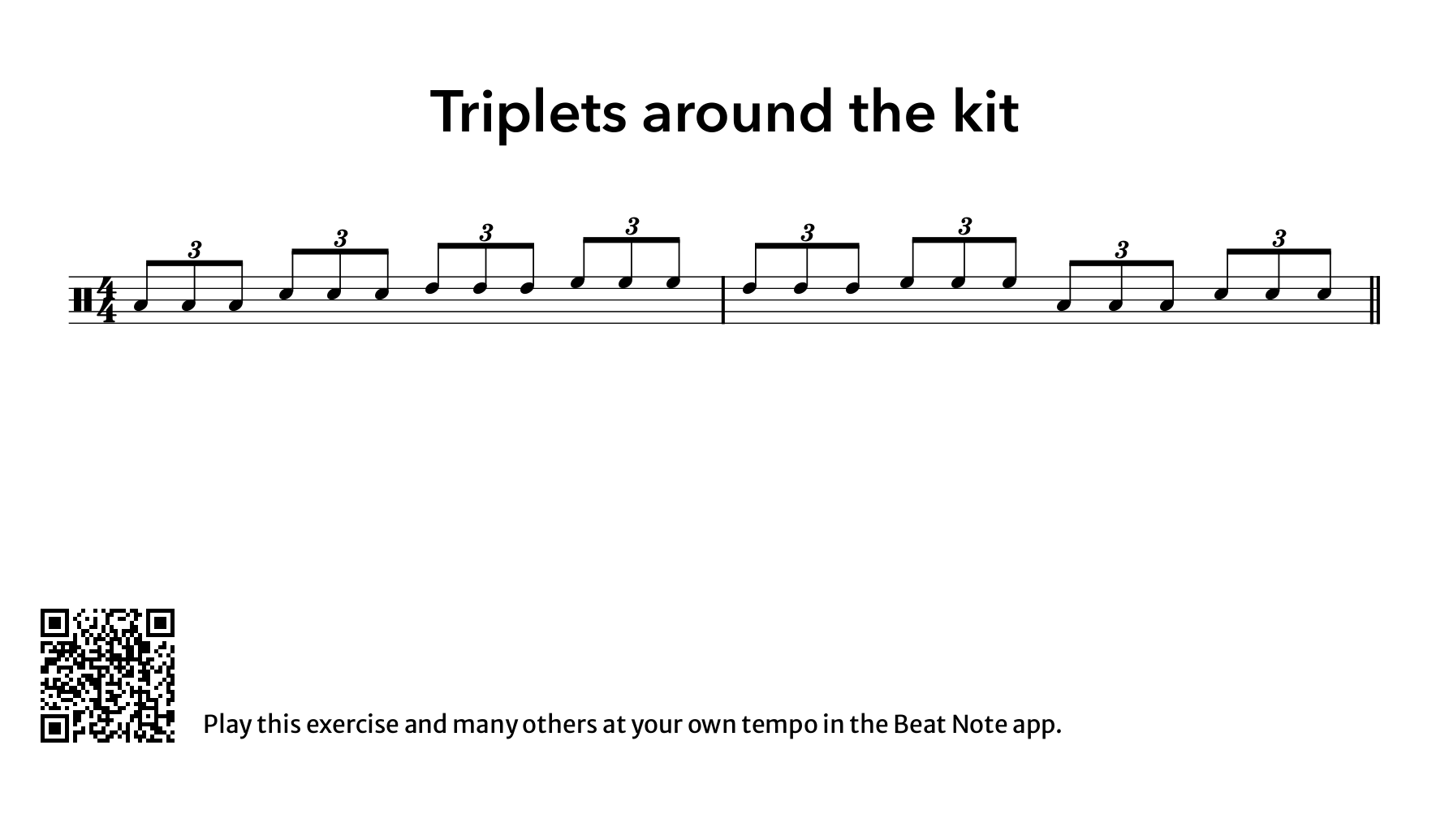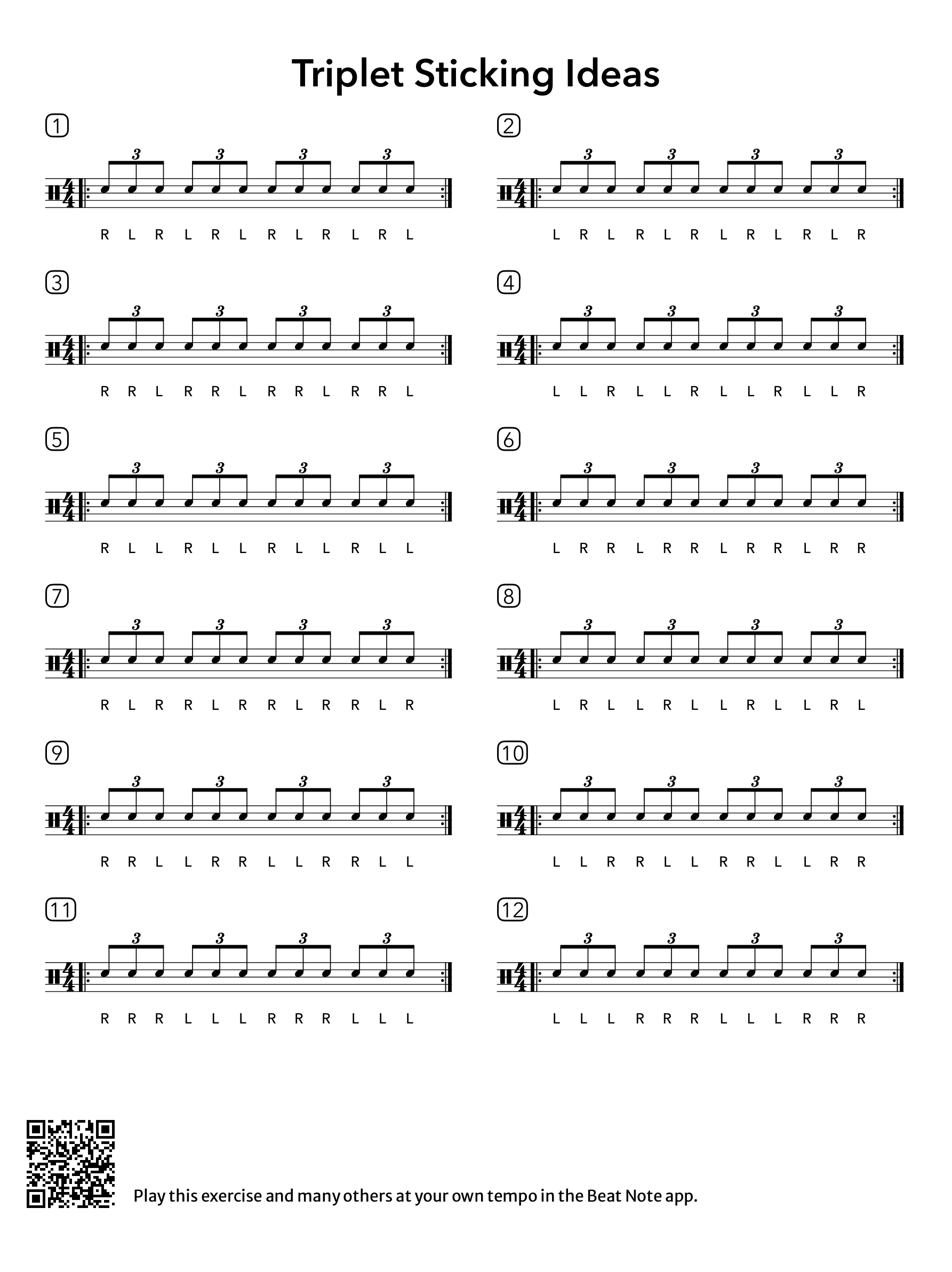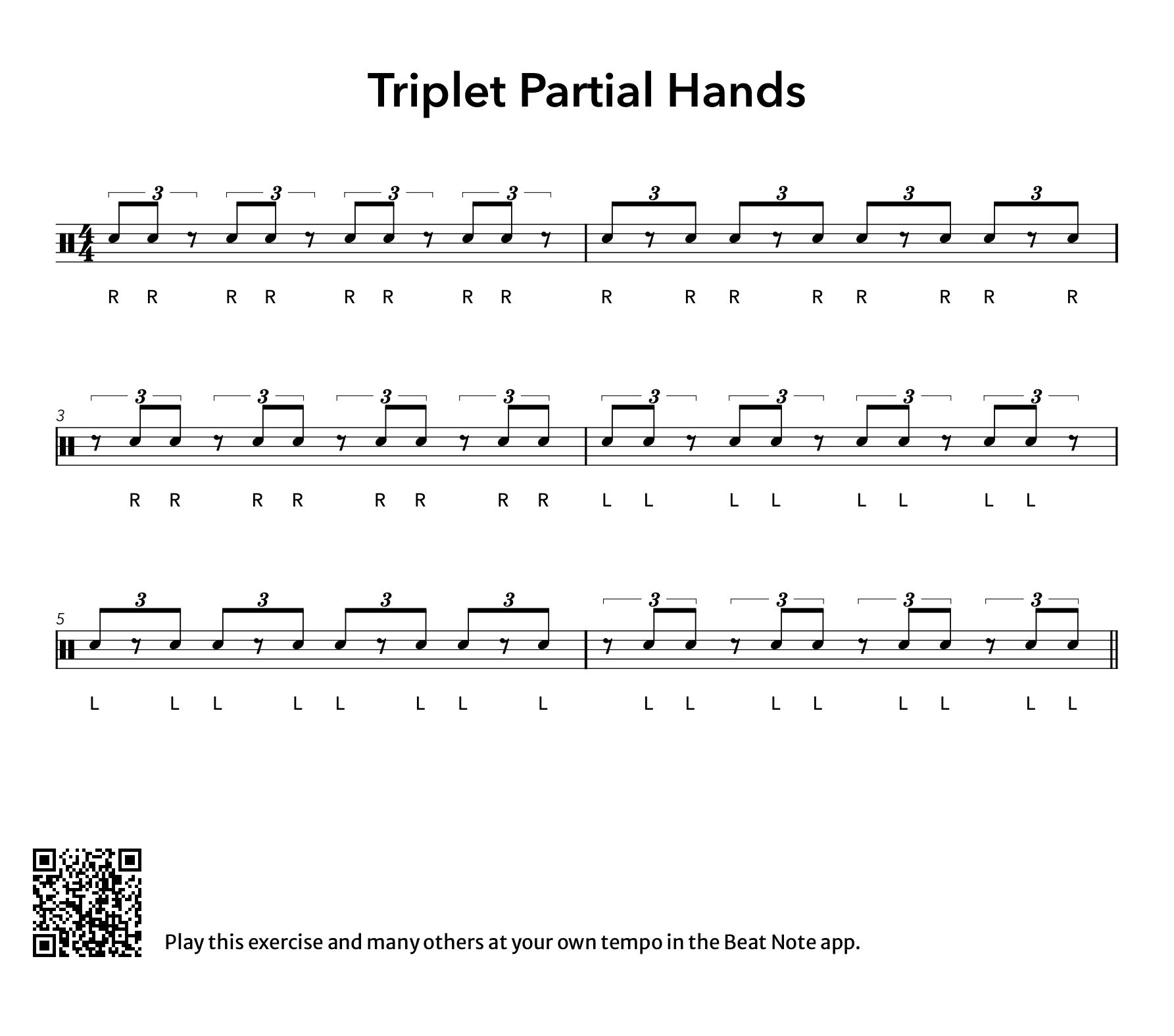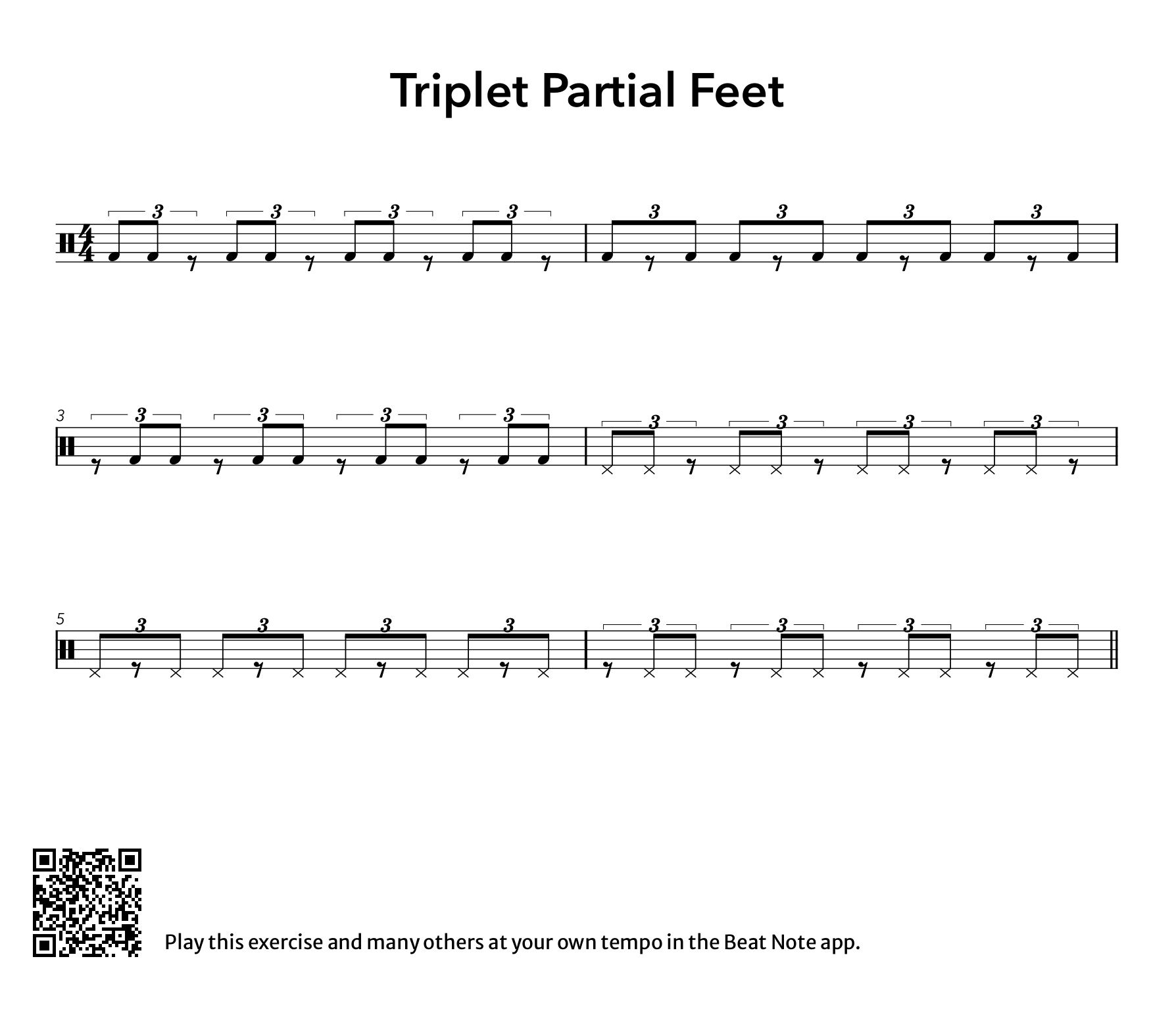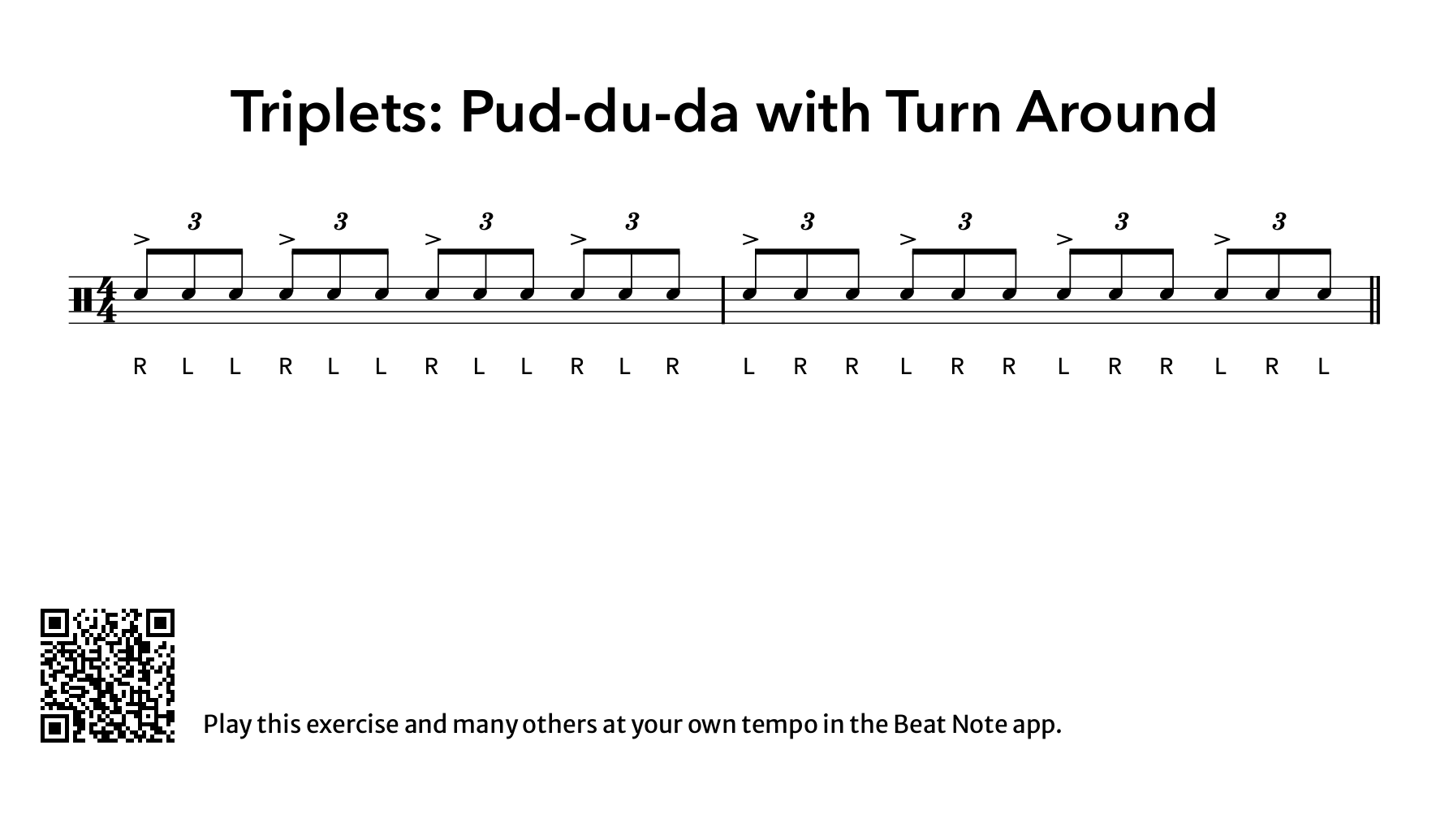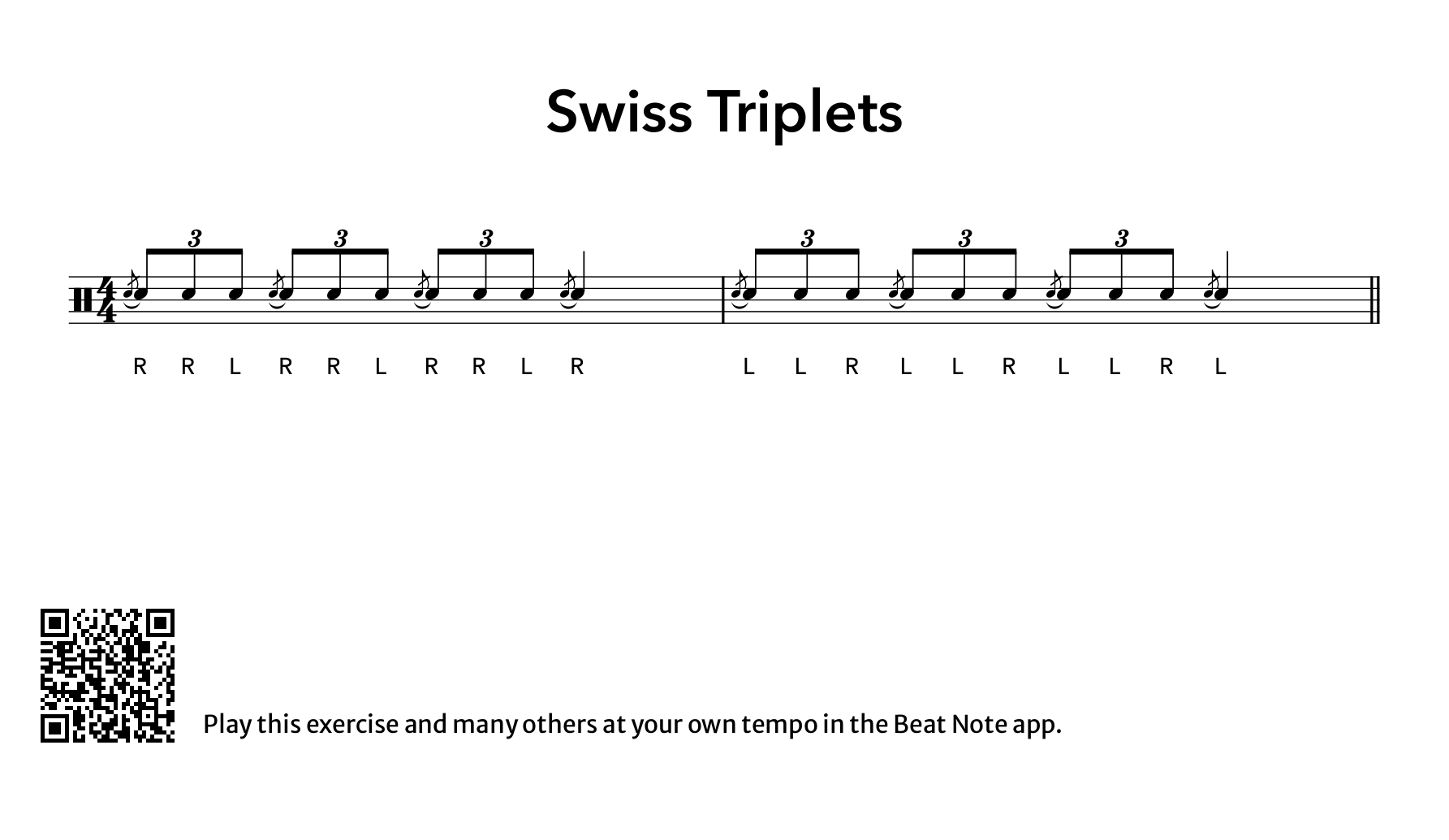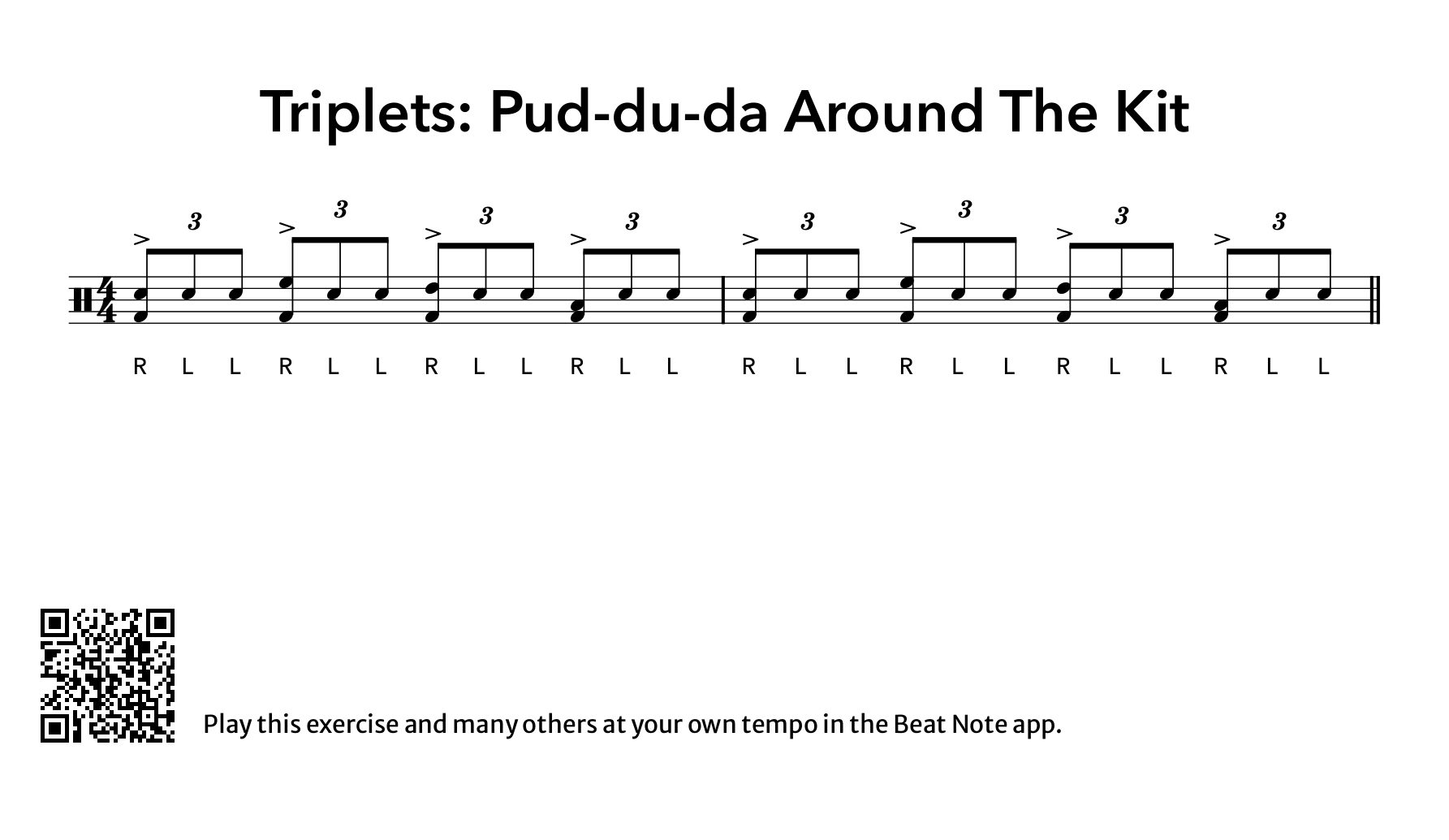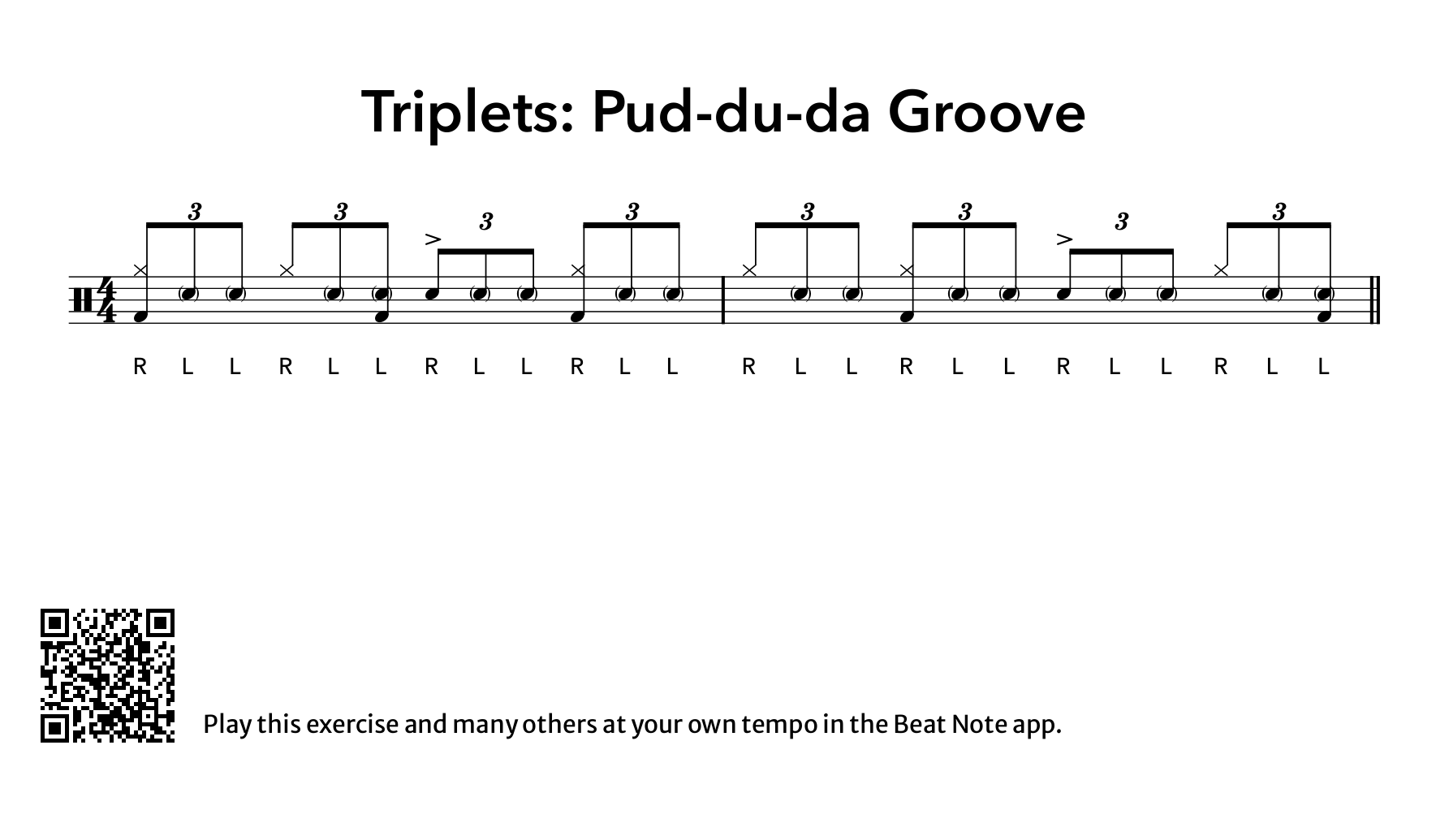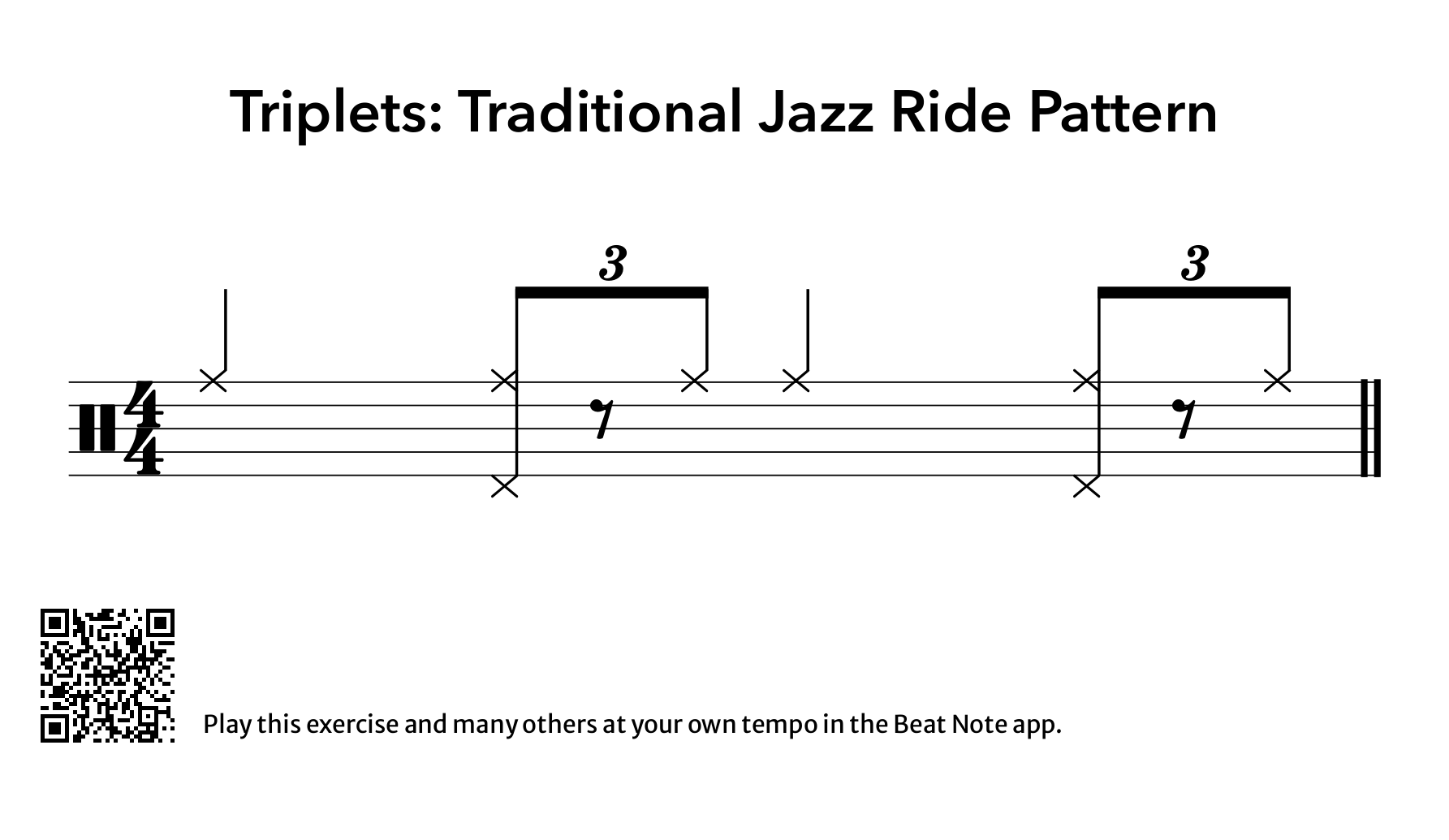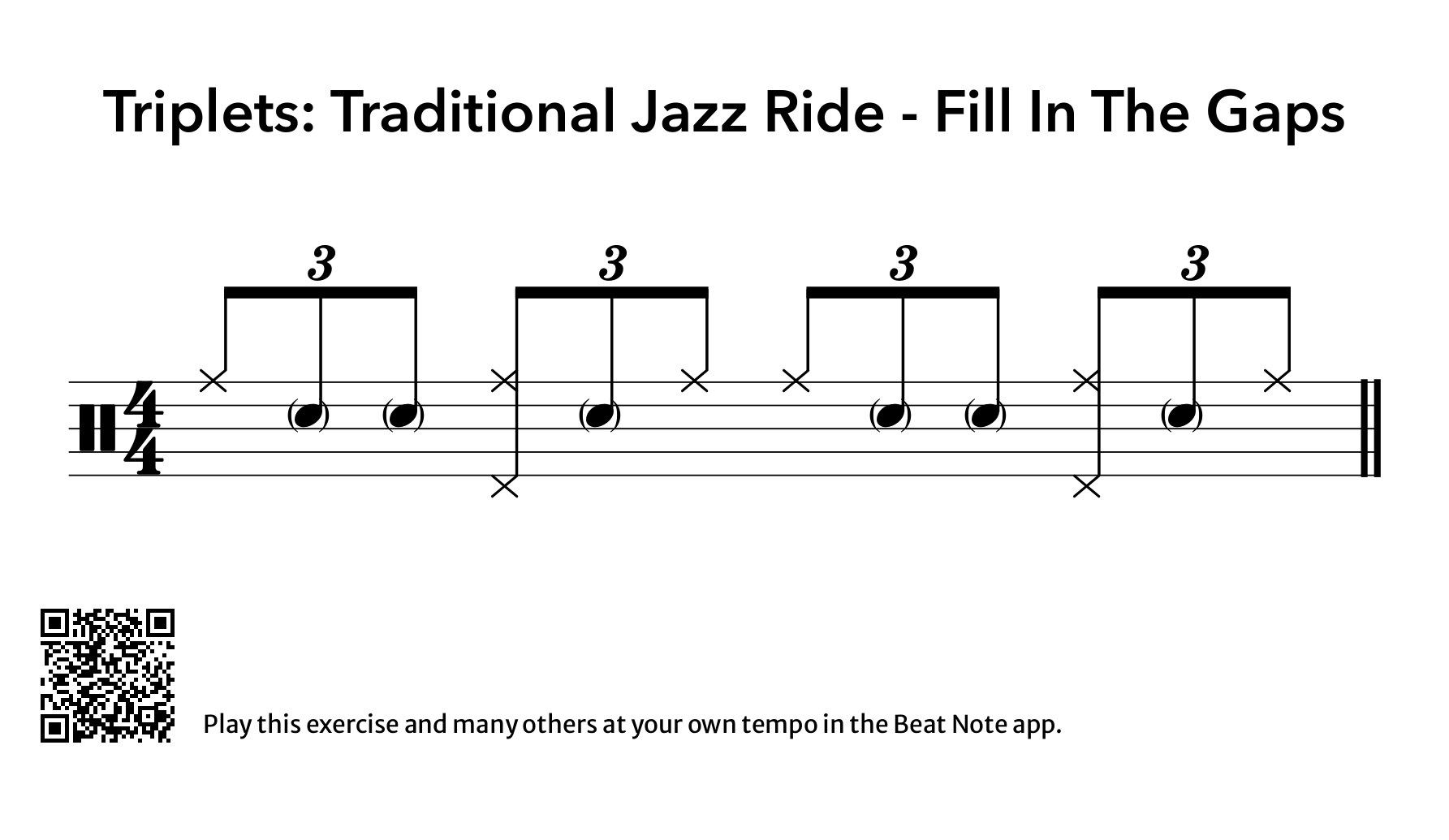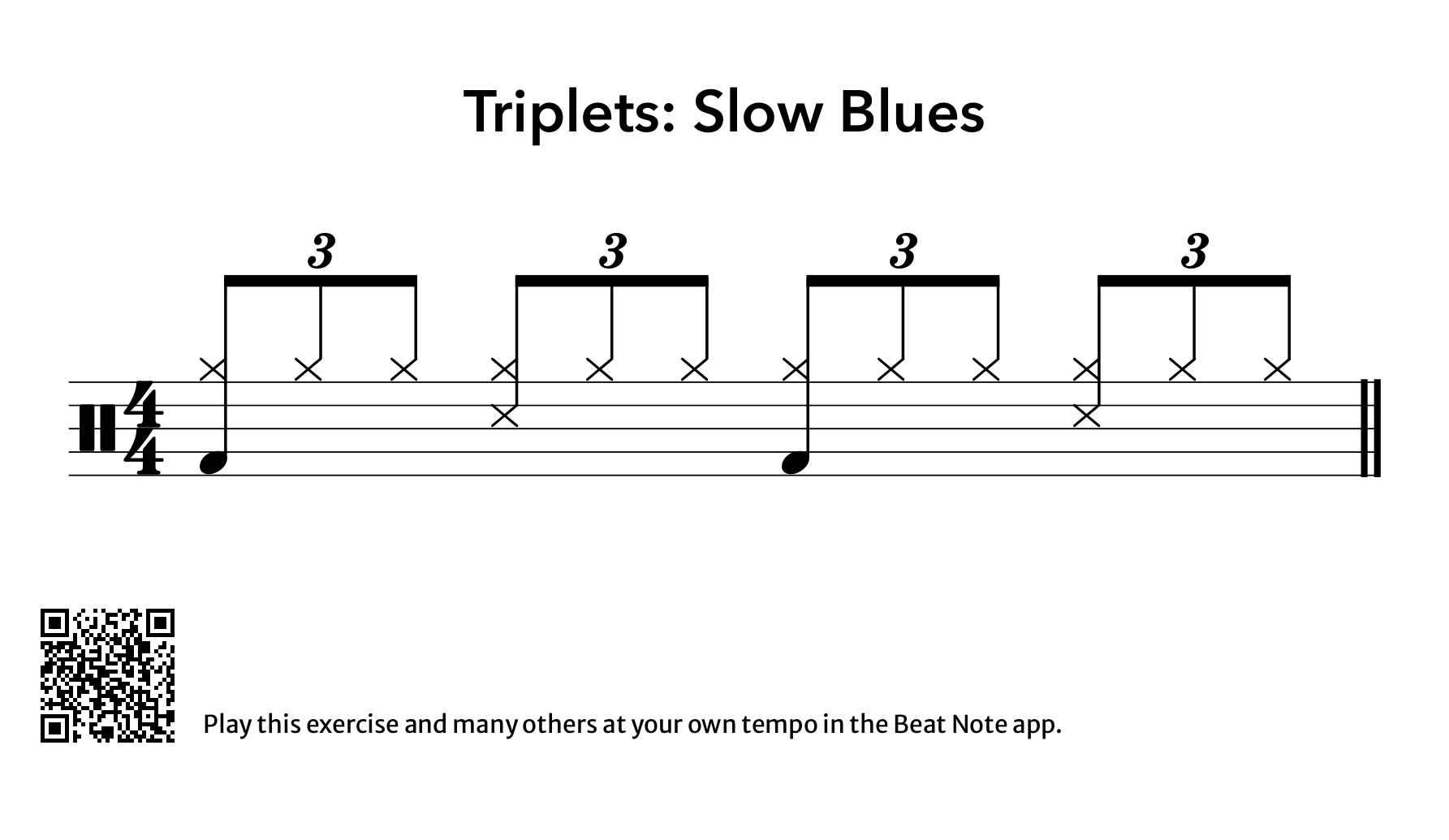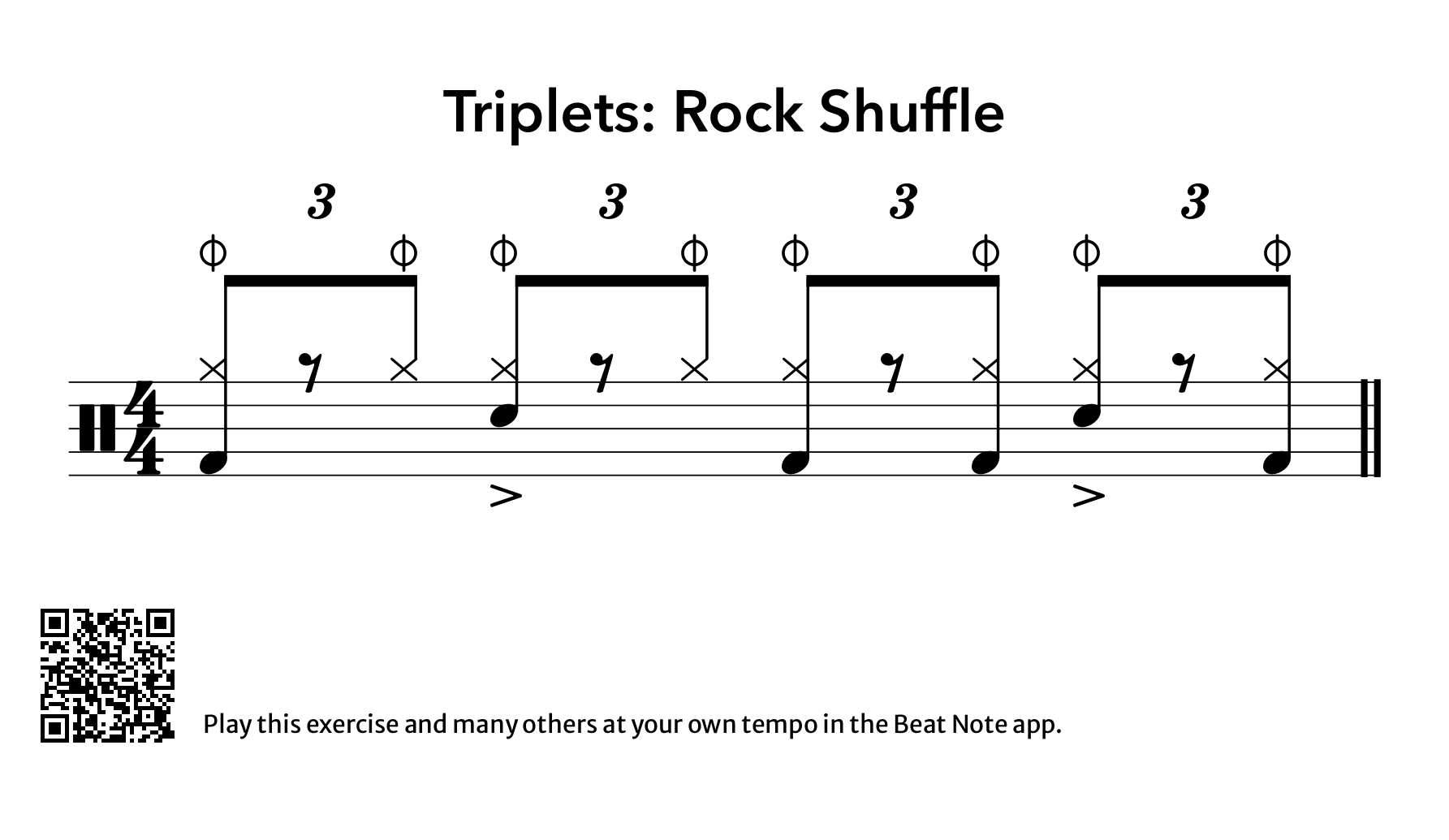You have to appreciate a grouping that allows equal hand-to-hand use. Triplets or groupings of 3 are great base rhythms for rudiments and are prevalent in various musical styles like Jazz, Blues, R&B, Rock, Metal, Reggae, Afro-Cuban, Drum & Bass, Pop, etc. You will also find many specific main-stream applications in drum grooves and patterns like Chicago shuffles, Texas shuffles, the Purdie shuffle, and the Porcaro half-time shuffle.
What Is A Triplet?
When a single quarter note is divided into three partials or pieces, we call it a triplet. Let’s look at an example in 4/4 in Drum Notation by Beat Note; notice how we put a small “3” above the grouping.
Triplet Example
Beat 1 shows a notated eighth note triplet followed by quarter notes on beats 2, 3, and 4.
Open Triplet Example in Drum Notation by Beat Note to change the tempo
Playing consecutive triplets is the perfect and most simplistic example of rhythmic symmetry for us drumming folk. Using natural sticking, R L R and L R L become the base of the triplet. Let’s apply this to 4 triplets in a row. These can be written in 12/8 or 4/4.
Four Triplets
Four triplets in a row. Beats 1-4 are showing eighth note triplets on each beat with natural sticking listed underneath
Open Four Triplets in Drum Notation by Beat Note to change the tempo
The versatile groupings of 3 allow for economy of motion around the drum kit as well. This subdivision lends itself to smooth patterns, unique rounds (voicing), and ease of execution, creating fluid speed.
Triplets Around The Kit
Moving eighth note the triplets around the kit. In the first bar, this pattern goes floor tom, snare drum, tom 2, tom 1. The second bar is tom 2, tom 1, floor tom, snare drum.
Open Triplets Around The Kit in Drum Notation by Beat Note to change the tempo
Triplet Drum Patterns On The Practice Pad
Back at our practice pad, let’s look at the individual partials in the triplet. We have a total of 3 partials or three spaces for notes. There are many fun ways to count these. The drumming community loves onomatopoeia; basically, any three-syllable word will work; choose the easiest for you. Some examples are: trip-o-let, 1-&-a, ra-di-o, 1-la-li, 1-te-ta, ta-ki-ta, etc.
Let’s apply some solid base sticking to these patterns in Drum Notation by Beat Note:
Triple Sticking Worksheet
Triplet sticking ideas. Much like Stick Control, we are moving through all the various sticking patterns. Listed are 12 permutations for eighth note triplets.
Open Triple Sticking Worksheet in Drum Notation by Beat Note to change the tempo
For triplets, you can choose to play a note in one, two, or all three of the spaces. Let’s put this concept to use for our drumming fundamentals, rudimental skill set, and incorporate leaving some space. Want to work on better doubles?
Triplet Partial Hands
Eighth note triplet partials for hands. Here are all the double combinations for hands.
Open Triplet Partial Hands in Drum Notation by Beat Note to change the tempo
How about better doubles for your feet?
Triplet Partial Feet
Eighth note triplet partials for feet. Here are all the double combinations for feet.
Open Triplet Partial Feet in Drum Notation by Beat Note to change the tempo
My favorite sticking is R L L, also known as a pud-du-da. Try this simple Pud-du-da pattern with a turnaround exercise:
Triplets: Pud-du-da with Turn Around
This mighty Pu-du-da with turn around exercise is great for building consistent triplet based doubles
Open Triplets: Pud-du-da with Turn Around in Drum Notation by Beat Note to change the tempo
My favorite rudimental application is playing Swiss triplets. The sticking is R R L or L L R, and the first note will include a flam.
Swiss Triplets
Rudimental application for triplets. The Swiss triplet.
Open Swiss Triplets in Drum Notation by Beat Note to change the tempo
Triplet Drum Patterns On The Kit
Back to our kit, it is time for some style and fill applications. Triplets, or groups of 3 help add emphasis to musical phrases. Playing an irregular rhythm, like fitting 3 notes in the space of 2 results in a syncopated feel or polyrhythmic type rhythm. Let’s move the above example of R L L, the mighty pud-da-da, around the kit:
Triplets: Pud-du-da Around The Kit
Keeping the left hand on the snare drum, let’s move the downbeat of the Pu- du-da around the kit
Open Triplets: Pud-du-da Around The Kit in Drum Notation by Beat Note to change the tempo
How about a triplet groove using the pud-da-da?
Triplets: Pud-du-da Groove
Moving the right hand between the hi-hat and snare drum creates a simple but really hip drum groove. Notice how the left hand plays “ghost notes”. These are low level taps on the snare drum.
Open Triplets: Pud-du-da Groove in Drum Notation by Beat Note to change the tempo
Next, let’s shift gears and develop a solid foundational jazz ride pattern.
Triplets: Traditional Jazz Ride Pattern
Jazz is based on triplets. Even quarter notes can “swing” in jazz. The traditional jazz ride pattern shows the “skip note” added on the third partial of beats 2 and 4 to create this pattern. Notice how the hi hat is stepped on 2 and 4.
Open Triplets: Traditional Jazz Ride Pattern in Drum Notation by Beat Note to change the tempo
Triplets: Traditional Jazz Ride Pattern - Fill In The Gaps
Here is the same traditional jazz ride pattern with the spaces filled in as ghost notes on the snare drum. Typically we would also “feather” the bass drum on all 4 downbeats or on 1 and 3 (aka 2 feel), depending what the bassist is playing.
Triplets, or groupings of 3, are also perfect for a slow blues.
Triplets: Slow Blues
Here is a standard traditional blues pattern for drum set. The hi hat or ride pattern is all eighth note triplets, plus we add a 2 and 4 side stick or back beat on the snare drum, while the kick can play on 1 and 3 or all 4 quarter notes.
Open Triplets: Slow Blues in Drum Notation by Beat Note to change the tempo
Finally, we will check out a stock rock shuffle.
Triplets: Rock Shuffle
Here is a basic rock shuffle. The hi hat is slightly open or sloshy, notated by the vertical slash through the circle above them. Your dominant hand will play the hi hats on every first and third partial of the triplet. For rock, add a rim shot back beat, and a strong kick underneath to support it.
Open Triplets: Rock Shuffle in Drum Notation by Beat Note to change the tempo
We are just scratching the surface of applications for triplet usage, and I hope you can already begin to see the depth of the rabbit hole.
Happy drumming, and enjoy your musical journey. Z
